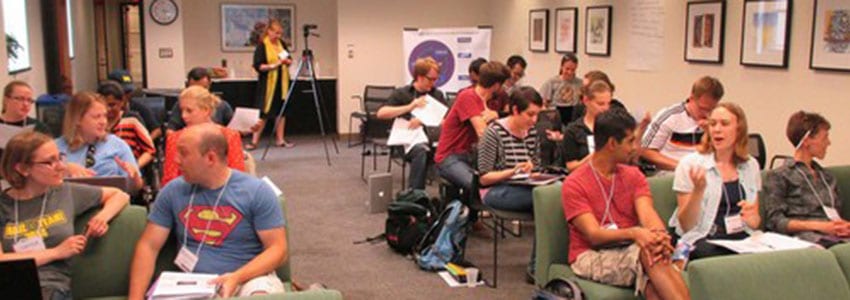Spend more than five minutes with a doctoral student and you’re all but guaranteed to hear her utter the word ‘interdisciplinary.’ More than a recruiting buzzword, interdisciplinary work is increasingly a common practice for students across departments to collaborate in creative ways. Rackham plays a big role in this interdisciplinary landscape, thanks in large part to the proliferation of Rackham Interdisciplinary Workshops (RIW). These efforts are designed to encourage exchange and collaboration among students and faculty who share intellectual interests but do not necessarily have an easily available forum in common because they have different academic affiliations. By creating opportunities for graduate students to find and create community among their peers, RIWs also serve to help advanced doctoral students form working groups that support the development of research projects and dissertation-writing.
Scott De Orio, the co-coordinator of the Doing Queer Studies Now (DQSN) RIW says, “Participating in DQSN has been a key aspect of my graduate education. It has helped me learn the important skill of giving good feedback on other graduate students' works-in-progress. The program has also helped me to participate in an intellectual community beyond the walls of the university by giving our group the funds we need to invite guest scholars to come speak at Michigan.”
The programs allow students to gather regularly (monthly or at times weekly) with a goal or end product such as a conference, symposium, research effort, paper or grant proposal. Completely student driven, Candidacy level graduate students serve as coordinators with a faculty member as sponsor. A glance at the list of nearly 80 workshops reveals a wide variety of efforts. Some of the impressive RIWs are detailed below.
With over 100 members, the Nanotechnology and Integrated Microsystems Student Association is an academic, career and social support network that targets university students working in the fields of Microelectromechanical systems (MEMS) and nanotechnology. With goals of increasing cross-disciplinary collaborations and building student-to-student as well as student-to-industry relationships, they also serve a larger population by educating pre-college and undergraduate students in skill sets necessary for entry into MEMS and nanotechnology fields.
A wide variety of departments are represented by graduate students in this group: material science, computer science, robotics, biomechanics, electrical, optical, and mechanical engineering, and biomedical engineering.
Originally developed to increase communication between sub-disciplines within the English department, the Language & Rhetorical Studies Workshop now encompasses faculty and graduate students from English Language and Literature, Linguistics, Education, History, Sociology, Anthropology, Communication Studies, American Culture, and Classical Studies. The group meets monthly to participate in discussions of readings, sharing of participants’ research and works-in-progress, lectures from visiting scholars, and participation in national conferences.
RELATE is a communications training and community engagement program built on “the belief that science communication should be a conversation, and not scientists lecturing audiences about their work.” Participants strive to communicate their work and its implications in a way that is accessible and meaningful to a broad audience. As a part of this RIW, graduate students participate in an intensive workshop with instruction and feedback from communication experts. They then put their newly refined skills into action by communicating research practice, progress, and issues with a broad audience in a series of community engagement events. Students and faculty from Education, Neuroscience, and Molecular, Cellular and Developmental Biology work together on developing curricula and offering training. This RIW received a “Community Choice Award” from the National Science Foundation for its efforts.
To help students create strong programs and opportunities to engage and learn together, RIWs can receive up to $6,000 in funding from Rackham for such activities as regular gatherings, books, speaker honoraria and expenses, tickets to exhibits or performances, and conference costs among other things. Being able to provide these interdisciplinary opportunities is part of why Rackham students look to us for creative learning opportunities. We are constantly looking for ways to help students make the connections they need to succeed as students.

